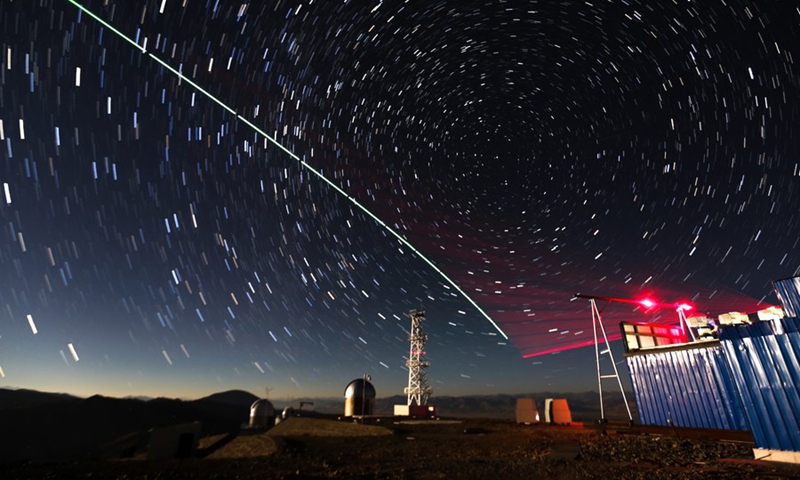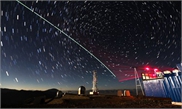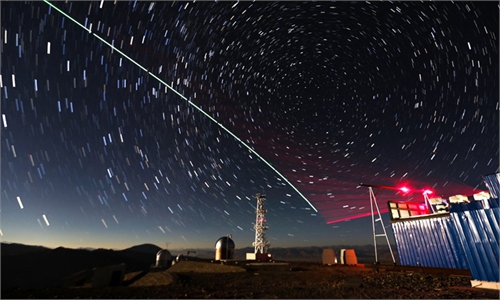Solution found to combat light-injection attacks, ensure security of quantum communications

Composite photo taken on December 9, 2016 shows a satellite-to-earth link established between quantum satellite "Micius" and the quantum teleportation experiment platform in Ali, Southwest China's Xizang Autonomous Region. File Photo: Xinhua
A group of scientists from China, Russia and Thailand have jointly developed a practical solution to combat light-injection attacks during quantum key distribution (QKD) to ensure the security of quantum communications, Russian media outlet Sputnik reported on Monday. Experts noted that advances in this technology are significant for the transmission of information that requires confidentiality.
In quantum cryptography, the secret key is sent in the form of photons, which cannot be cracked or copied. But there are risks with this type of transmission. If QKD is not performed exactly the right way, it becomes vulnerable to light-injection attacks, in which extra bright light is added to the QKD fiber and invisibly penetrates inside the secure stations to carry away bits of the secret key, according to Russia's National University of Science and Technology (MISIS), an institute that participated in the research.
To address this concern, physicists and security professionals have long been searching for effective countermeasures to prevent these hacks.
The scientists proposed one solution involving the addition of a sacrificial cheap device at the exit end of quantum key distribution fiber sources to resist light-injection attacks or break the quantum key transmission before hacking is successful.
The researchers examined off-the-shelf optical isolators and circulators by burning them with a high-power fiber laser, and found that they could serve this function.
"The result of the work was the creation of reliable protection against this class of attacks. We hope that the countermeasure we tested will be immediately applied in all industrial systems of quantum cryptography," said Vadim Makarov, head of the Laboratory of Analysis of Practical Vulnerabilities of Quantum Cryptography Systems and Development of Certification Methods of the MISIS University Quantum Communications Competence Center of NTI.
Quantum communication technology is much more secure compared with the common communication modes, Xiang Ligang, a veteran analyst of the telecom industry, told the Global Times on Tuesday. Under the mode of quantum direct communication, once there is an attack, it will automatically stop, Xiang said, noting that advances in this technology are significant for the transmission of information that requires confidentiality.
"This technology mainly addresses security problems, so it is not particularly noticeable for average consumers. However, telecom operators will demand it," Xiang said, further explaining that in the process of information transmission involving state secrets or other sensitive information, confidentiality measures should be taken to prevent eavesdropping or interception of information.
According to Xiang, although a series of breakthroughs have been made in the current quantum communication technology, the technology of quantum secure direct communication (QSDC) has not yet been applied in practice. However, it will hopefully be realized in the future.
A white paper on research into 6G released in 2021 pointed out that QSDC has the ability to detect eavesdropping, which has great potential in the next generation of secure communications.
The scientists from the Quantum Communications Competence Center of NTI in partnership with the Russian Quantum Center, as well as researchers from the ITMO University, the National University of Defense Technologies (NUDT) in China and the Quantum Technology Foundation of Thailand (QTFT) participated in the latest research.
The experiment was described in the PRX Quantum international journal and noted by the American Physical Society.
The 2022 Nobel Prize in Physics was awarded to three scientists, including French physicist Alain Aspect, American physicist John Clauser and Austrian physicist Anton Zeilinger for work exploring quantum weirdness. Their independent works explored the foundations of quantum mechanics and the paradoxical rules that govern behavior in the subatomic world.
Global Times



